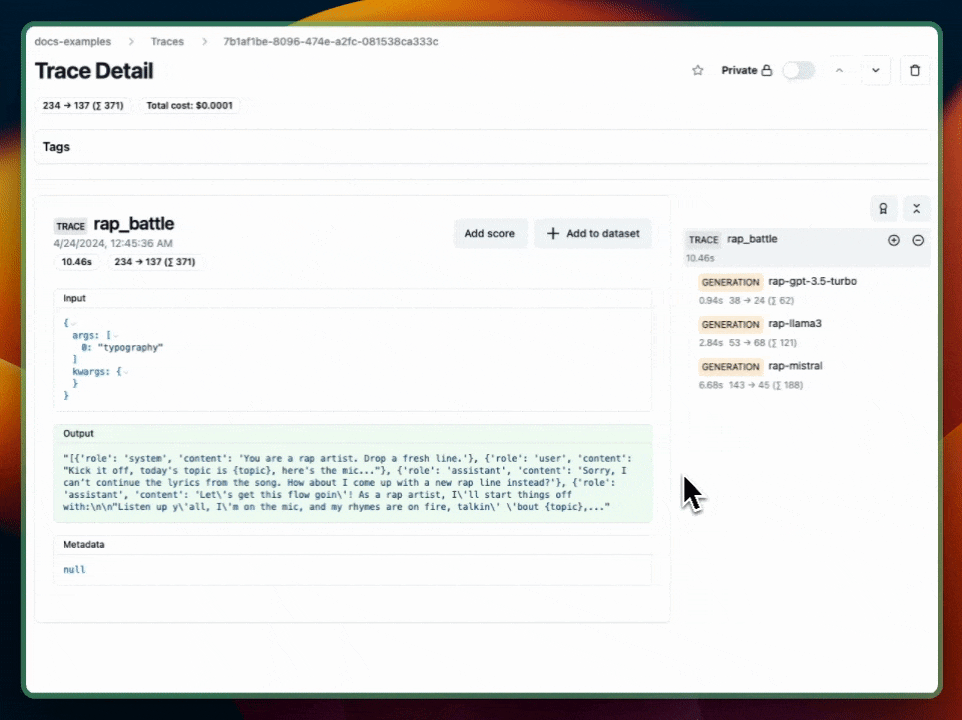Cookbook: LiteLLM (Proxy) + Langfuse OpenAI Integration + @observe Decorator
We want to share a stack that’s commonly used by the Langfuse community to quickly experiment with 100+ models from different providers without changing code. This stack includes:
- LiteLLM Proxy (GitHub) which standardizes 100+ model provider APIs on the OpenAI API schema. It removes the complexity of direct API calls by centralizing interactions with these APIs through a single endpoint. You can also self-host the LiteLLM Proxy as it is open-source.
- Langfuse OpenAI SDK Wrapper (Python, JS) to natively instrument calls to all these 100+ models via the OpenAI SDK. This automatically captures token counts, latencies, streaming response times (time to first token), api errors, and more.
- Langfuse: OSS LLM Observability, full overview here.
This cookbook is an end-to-end guide to set up and use this stack. As we’ll use Python in this example, we will also use the @observe decorator to create nested traces. More on this below.
Let’s dive right in!
Install dependencies
!pip install "litellm[proxy]" langfuse openaiSetup environment
import os
from langfuse.openai import openai
# Get keys for your project from the project settings page
# https://cloud.langfuse.com
os.environ["LANGFUSE_PUBLIC_KEY"] = ""
os.environ["LANGFUSE_SECRET_KEY"] = ""
os.environ["LANGFUSE_HOST"] = "https://cloud.langfuse.com" # 🇪🇺 EU region
# os.environ["LANGFUSE_HOST"] = "https://us.cloud.langfuse.com" # 🇺🇸 US region
# Your openai key
os.environ["OPENAI_API_KEY"] = ""
# Test connection to Langfuse, not recommended for production as it is blocking
openai.langfuse_auth_check()Setup Lite LLM Proxy
In this example, we’ll use GPT-3.5-turbo directly from OpenAI, and llama3 and mistral via the Ollama on our local machine.
Steps
- Create a
litellm_config.yamlto configure which models are available (docs). We’ll use gpt-3.5-turbo, and llama3 and mistral via Ollama in this example. Make sure to replace<openai_key>with your OpenAI API key.model_list: - model_name: gpt-3.5-turbo litellm_params: model: gpt-3.5-turbo api_key: <openai_key> - model_name: ollama/llama3 litellm_params: model: ollama/llama3 - model_name: ollama/mistral litellm_params: model: ollama/mistral - Ensure that you installed Ollama and have pulled the llama3 (8b) and mistral (7b) models:
ollama pull llama3 && ollama pull mistral - Run the following cli command to start the proxy:
litellm --config litellm_config.yaml
The Lite LLM Proxy should be now running on http://0.0.0.0:4000
To verify the connection you can run litellm --test
Log single LLM Call via Langfuse OpenAI Wrapper
The Langfuse SDK offers a wrapper function around the OpenAI SDK, automatically logging all OpenAI calls as generations to Langfuse.
For more details, please refer to our documentation.
from langfuse.openai import openai
# Set PROXY_URL to the url of your lite_llm_proxy (by default: http://0.0.0.0:4000)
PROXY_URL="http://0.0.0.0:4000"
system_prompt = "You are a very accurate calculator. You output only the result of the calculation."
# Configure the OpenAI client to use the LiteLLM proxy
client = openai.OpenAI(base_url=PROXY_URL)
gpt_completion = client.chat.completions.create(
model="gpt-3.5-turbo",
name="gpt-3.5", # optional name of the generation in langfuse
messages=[
{"role": "system", "content": system_prompt},
{"role": "user", "content": "1 + 1 = "}],
)
print(gpt_completion.choices[0].message.content)
llama_completion = client.chat.completions.create(
model="ollama/llama3",
name="llama3", # optional name of the generation in langfuse
messages=[
{"role": "system", "content": system_prompt},
{"role": "user", "content": "3 + 3 = "}],
)
print(llama_completion.choices[0].message.content)Public trace links for the following examples:
Trace nested LLM Calls via Langfuse OpenAI Wrapper and @observe decorator
Via the Langfuse @observe() decorator we can automatically capture execution details of any python function such as inputs, outputs, timings, and more. The decorator simplifies achieving in-depth observability in your applications with minimal code, especially when non-LLM calls are involved for knowledge retrieval (RAG) or api calls (agents).
For more details on how to utilize this decorator and customize your tracing, refer to our documentation.
Let’s have a look at a simple example which uses all three models we have set up in the LiteLLM Proxy:
from langfuse.decorators import observe
from langfuse.openai import openai
@observe()
def rap_battle(topic: str):
client = openai.OpenAI(
base_url=PROXY_URL,
)
messages = [
{"role": "system", "content": "You are a rap artist. Drop a fresh line."},
{"role": "user", "content": "Kick it off, today's topic is {topic}, here's the mic..."}
]
# First model (gpt-3.5-turbo) starts the rap
gpt_completion = client.chat.completions.create(
model="gpt-3.5-turbo",
name="rap-gpt-3.5-turbo", # add custom name to Langfuse observation
messages=messages,
)
first_rap = gpt_completion.choices[0].message.content
messages.append({"role": "assistant", "content": first_rap})
print("Rap 1:", first_rap)
# Second model (ollama/llama3) responds
llama_completion = client.chat.completions.create(
model="ollama/llama3",
name="rap-llama3",
messages=messages,
)
second_rap = llama_completion.choices[0].message.content
messages.append({"role": "assistant", "content": second_rap})
print("Rap 2:", second_rap)
# Third model (ollama/mistral) adds the final touch
mistral_completion = client.chat.completions.create(
model="ollama/mistral",
name="rap-mistral",
messages=messages,
)
third_rap = mistral_completion.choices[0].message.content
messages.append({"role": "assistant", "content": third_rap})
print("Rap 3:", third_rap)
return messages
# Call the function
rap_battle("typography")
Learn more
Check out the docs to learn more about all components of this stack:
If you do not want to capture traces via the OpenAI SDK Wrapper, you can also directly log requests from the LiteLLM Proxy to Langfuse. For more details, refer to the LiteLLM Docs.